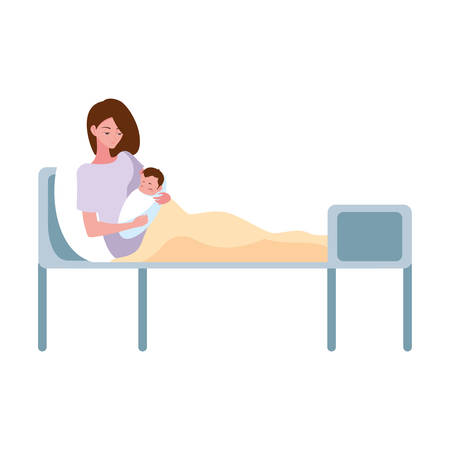Maternity and Paternity Costs
When planning for a baby in Britain, one of the first essential expenses to consider is the financial impact of maternity and paternity leave. Understanding your statutory entitlements is crucial, as this will directly affect your household income during this important period. In the UK, most employees are eligible for Statutory Maternity Leave of up to 52 weeks, with Statutory Maternity Pay (SMP) provided for up to 39 weeks. Fathers and partners may also be entitled to Statutory Paternity Leave and Pay, though these are shorter in duration. The table below outlines the current statutory allowances:
| Type of Leave | Duration | Statutory Pay (2024/25) |
|---|---|---|
| Maternity Leave | Up to 52 weeks | First 6 weeks: 90% of average weekly earnings Next 33 weeks: £184.03 per week or 90% of average weekly earnings (whichever is lower) |
| Paternity Leave | Up to 2 weeks | £184.03 per week or 90% of average weekly earnings (whichever is lower) |
It’s important to check if your employer offers enhanced pay packages, as some companies provide more generous support than the statutory minimum. Taking time off work will inevitably impact your household finances, so it’s wise to budget ahead for any potential drop in income. Consider how you will manage essential outgoings such as rent or mortgage payments, bills, and daily living costs during this time. Planning early can help reduce financial stress when welcoming your new arrival.
2. Healthcare and Baby Essentials
When planning for a baby in Britain, understanding healthcare provisions and budgeting for essential items is crucial. The NHS offers comprehensive pregnancy and new-born care, which greatly reduces medical expenses compared to many other countries. However, there are still out-of-pocket costs to anticipate.
NHS Provisions for Pregnancy and New-born Care
The NHS provides free antenatal appointments, scans (usually two standard ultrasounds), blood tests, and postnatal care. Prescriptions are also free during pregnancy and for 12 months after birth. While these core services are covered, some optional extras—such as private scans or specialist consultations—may incur additional charges.
Budgeting for Vitamins and Supplements
Healthcare professionals recommend specific vitamins during pregnancy, most notably folic acid and vitamin D. While some women may be eligible for free Healthy Start vitamins through government schemes, others will need to purchase them privately. Below is a guide to typical monthly costs:
| Supplement | Average Monthly Cost (£) |
|---|---|
| Folic Acid | £2–£5 |
| Vitamin D | £3–£6 |
| Prenatal Multivitamin | £4–£10 |
Scans and Additional Checks
The NHS covers the cost of routine ultrasounds at around 12 and 20 weeks. However, many parents choose to pay for extra private scans (e.g., early reassurance or 4D scans). These can range from £50–£150 per scan depending on location and clinic.
Essential Baby Gear and Everyday Items
Equipping your home for a new arrival involves budgeting for prams, car seats (required by law), cots, bottles, clothing, nappies, and more. The table below offers an overview of expected initial costs:
| Item | Estimated Cost Range (£) |
|---|---|
| Pram/Pushchair | £100–£800+ |
| Car Seat | £40–£300 |
| Cot/Cot Bed | £60–£250 |
| Bottle Starter Kit | £20–£60 |
| Nappies (per month) | £15–£30 |
| Baby Clothes (initial) | £40–£100 |
Careful planning and taking advantage of local schemes, second-hand options, or family support can help manage these essential expenses while ensuring your baby has everything needed for a healthy start in life.

3. Childcare Arrangements
One of the most significant ongoing costs for new parents in Britain is childcare. Understanding your options and the associated expenses is crucial when planning your family budget. Below, we review the typical fees, nursery choices, and available government support schemes.
Typical Childcare Fees
The cost of childcare varies greatly depending on location, the age of your child, and the type of care you choose. For instance, full-time nursery care in London can be considerably higher than in other parts of the UK. The following table provides an overview of average weekly costs:
| Type of Care | Average Weekly Cost (Full-Time) |
|---|---|
| Day Nursery | £250 – £350 |
| Childminder | £200 – £300 |
| Nanny (Live-out) | £400 – £600 |
Nursery Options
Parents can choose from various childcare settings, including private nurseries, childminders, or hiring a nanny. Each has its benefits: nurseries often provide structured activities and social opportunities, while childminders offer a more home-like environment and potentially more flexible hours. Nannies can provide one-to-one attention but are usually the most expensive option.
Government Schemes: Free Hours & Tax-Free Childcare
The UK government offers several schemes to help with childcare costs. All three- and four-year-olds are entitled to 15 hours of free early education per week during term time, with many families qualifying for up to 30 hours depending on their circumstances. Additionally, Tax-Free Childcare allows eligible working parents to get up to £2,000 per year per child towards childcare costs.
Understanding these schemes and incorporating them into your financial planning can significantly reduce your out-of-pocket expenses when raising a child in Britain.
4. Everyday Baby Needs
When planning for a baby in Britain, it’s essential to budget for everyday essentials that will be part of your regular spending. These recurring costs include nappies (diapers), formula or breastfeeding accessories, baby clothing, and various daily care items. While some expenses may fluctuate based on personal choices and your baby’s needs, having a clear understanding of these necessities can help you manage your finances more effectively.
Nappies and Changing Supplies
Disposable nappies are convenient but can quickly add up in cost over time. On the other hand, reusable cloth nappies involve a higher initial outlay but may save money in the long run. Don’t forget wipes, nappy creams, and changing mats, all of which are used frequently.
| Item | Estimated Monthly Cost (£) |
|---|---|
| Disposable Nappies | 30–40 |
| Wipes | 10–15 |
| Nappy Cream | 3–5 |
Feeding Essentials
If you choose to formula feed, expect regular purchases of formula powder, sterilising equipment, and bottles. For breastfeeding mums, you may need nursing bras, breast pads, nipple cream, and potentially a breast pump.
| Feeding Choice | Monthly Cost (£) |
|---|---|
| Formula Feeding | 40–60 |
| Breastfeeding (Accessories) | 10–20 |
Clothing and Laundry
Babies outgrow clothes rapidly, so it’s wise to plan for new outfits every few months. Factor in the cost of vests, sleepsuits, hats, socks, and seasonal clothing. Additionally, increased laundry means higher detergent usage and energy bills.
Average Clothing Costs per Month: £20–30
Laundry & Detergent: £5–10 extra per month
Daily Care Items
This category covers toiletries such as baby shampoo, body wash, moisturiser, soft towels, and grooming kits (nail clippers, brushes). Stocking up on these items ensures your baby is comfortable and well-cared-for every day.
Total Estimated Monthly Spend on Everyday Needs: £100–180
Being mindful of these regular expenses can make a big difference in staying financially prepared as your family grows. Consider buying in bulk when possible or looking for supermarket own-brand options to save money without compromising quality.
5. Home and Lifestyle Changes
Preparing for a new baby often means making practical adjustments to your home and lifestyle, which can come with significant costs. From evaluating the need for essential baby equipment to considering whether your current living space is suitable, it’s important to budget accordingly. Below is a breakdown of common expenses British families face:
| Item | Estimated Cost (GBP) | Considerations |
|---|---|---|
| Pram/Pushchair | £100–£1,000 | Essential for getting out and about; look for models that suit local terrain and transport needs. |
| Car Seat | £50–£300 | A legal requirement from birth; ensure compatibility with your vehicle and safety standards. |
| Cot/Cot Bed | £70–£400 | Vital for safe sleep; consider longevity as some cots convert into toddler beds. |
| Larger Home/Moving Costs | Variable (£1,000s) | If your current property is too small, moving or upsizing may be necessary—factor in deposits, agent fees, and higher rent or mortgage payments. |
| Insurance Adjustments | £50–£200/year increase | You may need to update home and life insurance policies to cover new family members and valuable items. |
| Utility Bills | £20–£60/month increase | Expect higher water, heating, and electricity usage with a new baby in the house. |
As you plan for these changes, it’s wise to research products thoroughly—British retailers often have seasonal sales or second-hand options available through community groups or online marketplaces. For those renting, reviewing your tenancy agreement early can help avoid unexpected obstacles if you need more space. Additionally, updating insurance ensures peace of mind should any mishaps occur. With a clear understanding of these essential expenses, you’ll be better prepared for the transition to family life in Britain.
6. Emergency and Miscellaneous Expenses
While meticulous budgeting is essential for new parents, it’s equally important to prepare for the unexpected. Allocating a contingency fund can safeguard your family against unforeseen costs that often arise when raising a baby in Britain. These might include unexpected medical needs, extra childcare during emergencies, or last-minute purchases such as replacement equipment or urgent clothing needs.
Why an Emergency Fund is Crucial
The NHS covers many healthcare needs, but certain treatments, prescriptions, or specialist appointments may not be fully funded. Similarly, if your usual childcare arrangement falls through or your baby requires additional support, you might need to pay for ad-hoc care at short notice. Having a financial cushion helps you avoid unnecessary stress and ensures your baby’s wellbeing remains the top priority.
Common Unexpected Expenses
| Expense Category | Examples | Estimated Cost (GBP) |
|---|---|---|
| Medical Emergencies | Non-NHS prescriptions, private GP fees, specialist consultations | £20–£150 per visit/item |
| Childcare Cover | Emergency babysitters, nursery day rates | £50–£100 per day |
| Last-Minute Purchases | Bottle warmers, extra clothes, replacement pram parts | £10–£200 each |
| Home Repairs/Adaptations | Fixing heating issues, adding safety gates quickly | £50–£300 per repair/adaptation |
Practical Tips for Building a Contingency Fund
- Aim to set aside at least 5–10% of your overall baby budget as an emergency fund.
- Consider opening a separate savings account specifically for unplanned baby expenses.
- Review your budget quarterly and adjust contributions as needed based on actual spending.
- If you receive Child Benefit or other government support, consider allocating part of these funds towards your contingency fund.
No matter how well you plan, surprises are inevitable on the parenting journey. By proactively setting aside funds for emergencies and miscellaneous costs, you’ll have peace of mind knowing you’re financially prepared for whatever comes your way while raising a baby in Britain.


